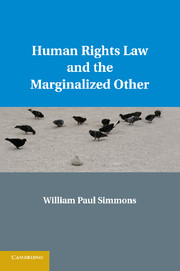Book contents
- Frontmatter
- Brief Contents
- Contents
- Preface
- Introduction
- Part I Deconstruction of Human Rights Law
- Part II Phenomenology of the Saturated Other
- Part III Human Rights of the Marginalized Other
- Conclusion Working with the Marginalized Other to Deconstruct and Reinvigorate Human Rights Law
- Bibliography
- Index
Preface
Published online by Cambridge University Press: 07 October 2011
- Frontmatter
- Brief Contents
- Contents
- Preface
- Introduction
- Part I Deconstruction of Human Rights Law
- Part II Phenomenology of the Saturated Other
- Part III Human Rights of the Marginalized Other
- Conclusion Working with the Marginalized Other to Deconstruct and Reinvigorate Human Rights Law
- Bibliography
- Index
Summary
Preface
This ambitious and complex work of both philosophy and human rights law seeks to make major advances in both fields and to develop a fresh dialogue between the two. I delve into a wide range of philosophical works in considerable detail, especially debates in recent philosophies of the “Other,” and analyze many legal cases from disparate jurisdictions around the globe. In the philosophical chapters, I analyze concrete legal situations, and I suffuse the legal chapters with philosophical insights. To make this work more accessible to a range of readers, and not just philosophers and political theorists, this preface quickly lays out the overall argument of the work and provides a roadmap for the reader, especially those in nonacademic fields who may be attracted to the topic but might find some more densely theoretical sections relatively inaccessible.
In a nutshell, this book argues that human rights law should be deconstructed – that is, continuously examined and critiqued to expose existing dominant power relations – and reinvigorated by adopting a new theoretical orientation, one that privileges the voices of people who are excluded from social and political power, referred to in this work as the Marginalized Other. The two chapters in Part I make the case for critically examining or deconstructing the prevailing modes of thought that inform human rights law through detailed readings of works by political theorists Hannah Arendt and Seyla Benhabib. These chapters aim to show the resilience of dominant or hegemonic ways of thinking and the need to have a more radical deconstruction of these discourses to privilege the voice of the Marginalized Other. I argue that to conduct the necessary deconstruction of hegemonic ways of thinking requires a new way of thinking about the Other, one that is founded in transcendence – that is, beyond the hegemonic discourses – but that also can be made concrete to affect the political and social realms in a profound way. The two more theoretically rich chapters in Part II develop my phenomenology of the Saturated Other by combining insights from the philosophies of Emmanuel Levinas, Jean-Luc Marion, and Enrique Dussel. Note: When referring to my phenomenological account of the Other that is excluded from power, I will use the term “Saturated,” because the ego owes a deeper, more saturated responsibility to this Other than to those within the system. When referring to the resulting application of this phenomenology to human rights and human rights law, I will refer to the “Marginalized” Other. The two are interchangeable, but the term “Saturated” has more of a technical philosophical meaning. The three chapters in Part III further develop this phenomenology, especially through the writings of feminist scholars Gayatri Spivak and Judith Butler. This part also shows how scholars and activists can concretely reinvigorate contemporary human rights law by analyzing such critical issues as environmental displacement in India, asylum law in the United States, aboriginal rights cases from Canada, reparations in the Inter-American Court of Human Rights, and the right to mental health in the African Commission on Human and Peoples’ Rights. Throughout the work, the theoretical insights are made concrete through the case law, and the case law is deconstructed and reinvigorated by theoretical insights.
- Type
- Chapter
- Information
- Human Rights Law and the Marginalized Other , pp. xiii - xviPublisher: Cambridge University PressPrint publication year: 2011



